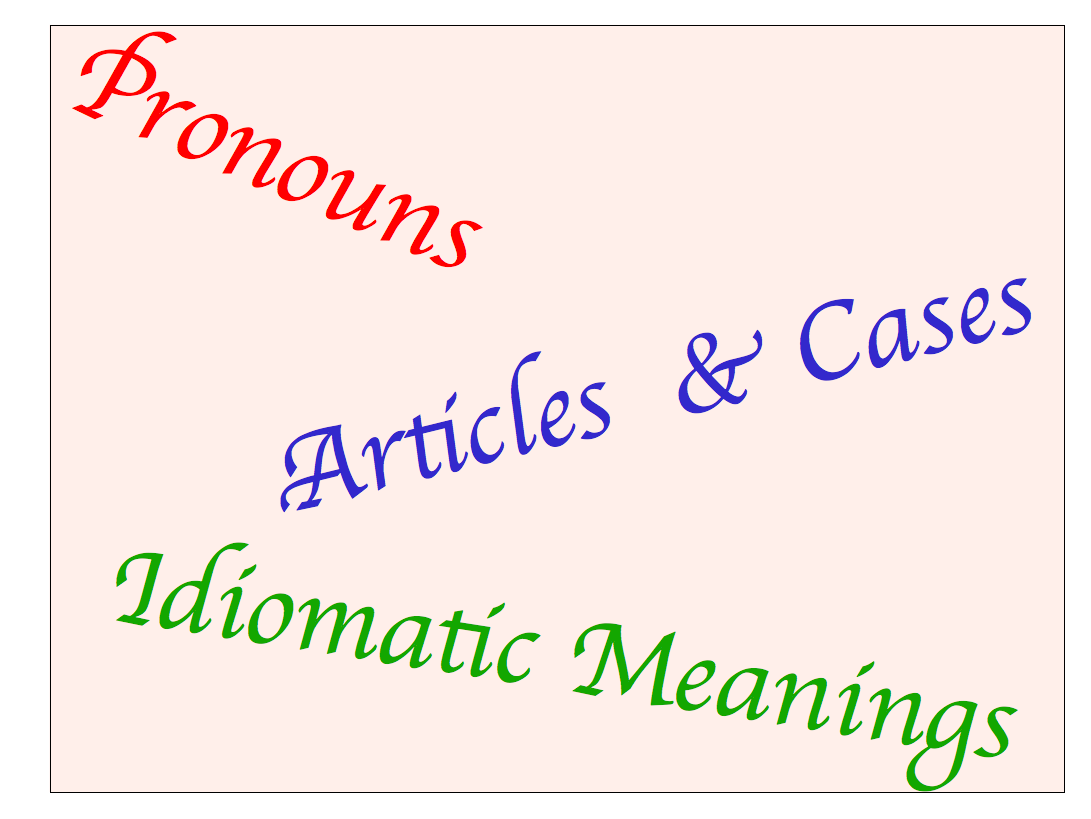3 Reasons for Learning German in Context
 There's nothing wrong with Flashcards, I love them for practicing vocabulary and we use them in our games as well.
There's nothing wrong with Flashcards, I love them for practicing vocabulary and we use them in our games as well.
But learning only with traditional flashcards - or sticking only to list learning, for that matter - is bound to keep you in the rank of beginner.
To bust through the beginner ceiling, you have to learn to use phrases and sentences as part of communication. That's where context learning comes in. Here are three simple reasons for learning German in context.
Pronouns
German consistently uses pronouns with specific verb forms (as opposed to Italian or Spanish, for example). But because some of the German pronouns are multi-functional or are part of an idiom, you need the context to understand what's going on.
A perfect example is “sie/Sie”:
• Wann kommt sie? - When is she coming? [she - subject]
• Wann kommen sie? - When are they coming? [they - subject]
• Und kommen Sie auch? - And are you also coming? [you(formal) - subject]
• Ich kann Sie nicht sehen. - I can't see you. [you(formal) - direct object]
• Ich kenne sie nicht. - I don't know her/them. [her/them - direct object]
The word "sie" can also refer to a "feminine gender" object or animal:
• Die Hütte dort, siehst du sie? - The hut over there, do you see it? [it(f) - direct object]
• Die Katze dort, sie wartet auf ihre Milch. - The cat over there, it's waiting for its milk. [it(f) - subject]
And the German “ihr/Ihr” could mean in English: “you” [plural familiar], “her” [indirect object], “their” [possessive pronoun], “your” [formal] or also “to her” in various German idioms.
When learning the various uses of “sie/Sie” or “ihr/Ihr,” it is useful to have specific phrases or sentences in mind.
Articles and Cases
In German, articles and noun cases are matched – often in mysterious ways for beginners:
• “der” is not only the masculine article, as in : [der See] Der See ist .... - The lake is .... [m – subject), • "der" can also can precede a feminine noun, as in:
• [die Frau] Ich gebe der Frau ... - I give (to) the woman ... [f, indirect object]
• [die Kirche] Das Tor der Kirche ist .... - The door of the church .... [f , possessive]
• [die Stimme] Die Anzahl der Stimmen ... - The number of votes ... [f pl, possessive]
Similarly, “die” is not only the feminine article, "die" is also the plural form for all nouns that are a subject or a direct object, as in:
• [das Haus] Die Häuser sind ... - The houses are ... [neuter, pl subject]
• [der Baum] Die Bäume sind ... - The trees are ... [m, pl subject]
• [die Straße] Die Straßen sind ... - The streets are ... [f, pl subject]
• Ich sehe die Häuser, die Bäume, und die Straßen. - I see the houses, the trees, and the streets. [direct objects]
Idiomatic meanings
Some words change their meaning, depending on the context. For example (as shown by a post circulating on Facebook), the word “Bitte" has multiple meanings.
As a simple statement, “Bitte” basically means “Please”. But it can also mean “Go ahead.”; or “I don't mind”; or “You're welcome.”; or “Here you are.”; or “Not at all.” In addition, the question “Bitte?” is often used as “Pardon me?”
While “Danke” simply means “Thank you,” in a specific context, it can mean: “Yes, thank you.” or “No, thank you.”
And, the much-used word “gut” (good) can change its meaning in idioms such as:
• “Gut, das machen wir.” - Okay, we'll do that.
• “Mir geht's gut.” - I'm feeling great.
• “Mir ist nicht gut.” - I'm not feeling well.
• “Jetzt ist es aber gut.” - That'll do.
• “Schon gut.” - That's enough.
Learning vocabulary is clearly necessary – and Flashcards are a great tool for that – but simply knowing groups of words is not enough to really understand and speak German. It's best to learn those words in the context of a topic that interests you.
You will better remember the words when you recall them as part of meaningful phrases and sentences. Moreover, when you use them in new sentence combinations, applying the grammar rules will be much easier.
And we certainly agree with author Andy Hunt (co-author of “Pragmatic Thinking and Learning”) whom we had quoted in My Rosetta Stone Blog - 3: “Always Consider the Context ... because it is important for understanding the world around us."
